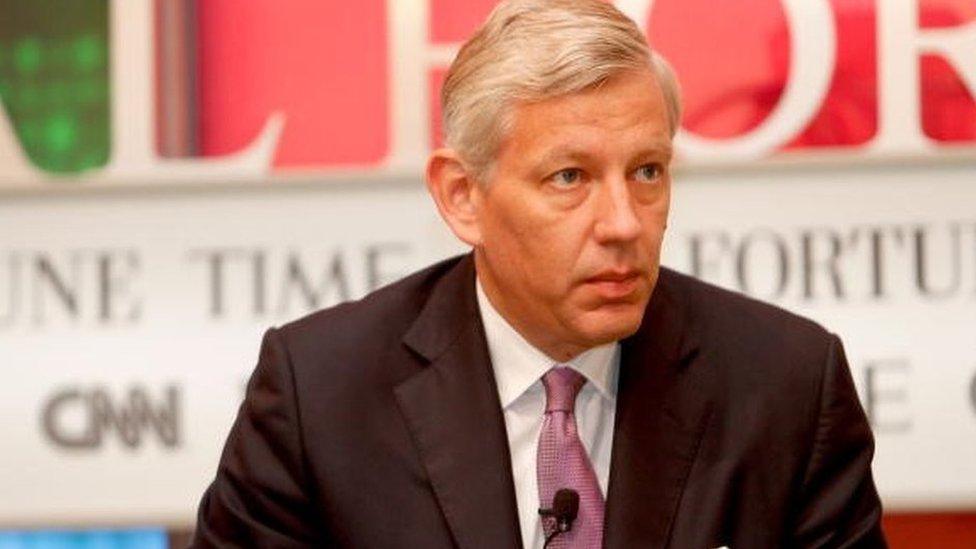Will not criticising make you a better boss?
- Published
In reality, you have to learn on the job and then you either sink or swim, says CEO coach Steve Tappin.
As a child when Sir Richard Branson said anything nasty about anyone else, his parents sent him to his room to look at himself in the mirror.
He would have to stand there staring at his reflection thinking about what he'd said.
His parents' intention was to try to make him realise that being nasty or negative about other people was unkind and reflected badly on him.
It was an effective lesson. "Looking at myself in the mirror for five minutes wasn't much fun so I stopped ever criticising people," he says.
Even once he grew up to become the founder of Virgin Group - which has gone from a mail order record company to having businesses in telecoms, travel and financial services - it's a practice he's stuck to.

Praise rather than criticise your staff is Sir Richard's advice
Sir Richard is adamant that to this day it's some of the most important advice he's ever received.
"If I ever hear people gossiping about people I'll walk away. As a leader you've just got to get out there and look for the best in people and that's really really important.
"Let them get on with it, not criticise them when they make mistakes and praise them when they do good things," he says.
Outdated image
It seems surprising that someone could become one of the UK's best-known and wealthiest entrepreneurs, creating a multi-million pound business, without criticising their staff.
Yet while the stereotypical image of an all powerful, dominant, alpha-male type character running a company persists, in many cases it's an outdated image.
The financial crisis in particular has forced a widespread rethinking of how to run a business and the days of the all powerful, domineering chief executive may be coming to an end.
Not criticising is just one element of a less hierarchical approach to being the boss.

Pretending to be a superhero who knows it all is not an effective way to lead a company says CEO coach Steve Tappin
CEO coach Steve Tappin says the pressure of having the top job means that it's easy for chief executives to "fall into the trap" of trying to be a superhero, pretending to know it all and unwilling to admit any failings.
"The best chief executives are not like that. They know that great leaders are great learners," he says.
Andrew Penn, chief executive of Australian telecommunications giant Telstra, has been the boss of the firm for less than a year, and despite having previously been at the helm of another large firm he says that it's impossible to have all the answers.
"The days of the rock star CEO are long gone. The CEO is just a member of a team and it's about bringing together a capable team," he says.
Nonetheless, he says, as the person officially in charge, it's important to have enough self confidence to lead the firm according to your own convictions.

Bosses are judged more by how they behave than the decisions they make, says Telstra boss Andy Penn
Of course, it won't always go to plan. In fact, Mr Penn says he's made so many mistakes that it's impossible to list them all, but says it's all part of building up valuable experience and that crucially he learned a lot from them.
In the end what people remember is less what the boss did and more how he behaved, he says:
"When you're going through tough situations it's as important how you conduct yourself through the process as it is in terms of the actual decisions that you make in the process.
"Ultimately what people will remember more than anything, is how you behaved and how you conducted yourself and how you acted as a leader as much as whether or not you actually made the right or the wrong decision."

McKinsey boss Dominic Barton says it took him two years to get to grips with being in charge
As far as Dominic Barton, global head of management consultancy firm McKinsey, is concerned, a boss new to the role should avoid making any major decisions at all initially and recognise that it will take time to learn how to do the job effectively.
Despite having been at the firm for over two decades before he took the helm, Mr Barton says heading up an organisation is very different. In his case, he says it took him two years just to get to grips with the different dynamics of being in charge.
Working out what the main issues to tackle are, and who can be relied upon to help drive the changes takes time and means it's important not to rush into anything, he says.
"It takes a while to establish legitimacy.
"Even if you've been appointed or elected, people, are saying how is this person going to work," he says.

Chic by Choice rents designer dresses sourced from well known brands
Filipa Neto, co-founder of Chic by Choice, an online marketplace start-up which rents out designer dresses, enabling people to hire rather than buy them, has experienced exactly this problem, but with people outside the business.
As a 25-year-old boss of the start-up she says it has been hard to persuade more well-known designers and established brands to join her database of suppliers.
But she's not been discouraged. To prepare herself for the company's growth and being in charge of a larger firm she spends her spare time reading up on business books to find out how other chief executives succeeded.
"I learn a lot from all these people and I never forget. If somebody else has already done it in a clever way, why should I try to reinvent the wheel?
"I don't want to make the mistakes they've already made," she says.
This feature is based on interviews by CEO coach and author Steve Tappin for the BBC's CEO Guru series, produced by Neil Koenig.